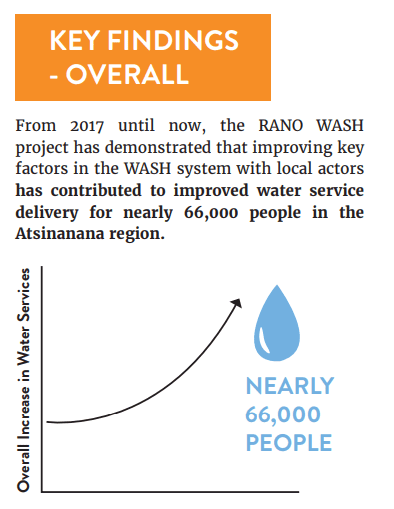RANO WASH’s systems strengthening work contributed to improved water services in Atsinanana region, Madagascar
Voir en français ici

Control and verification of infrastructure on Ivato Centre, Amoron’i Mania region, including the managing company and investor, representatives of the municipality, RANO WASH teams and the project manager (RANOWASH/Dahery RAZAKA)
Agenda for Change supports its members to deliver systems change and document and share their experiences in the water, sanitation, and hygiene (WASH) sector. As part of that overall effort, the Global Hub contracted a team from the Springfield Centre and Aguaconsult to test and apply an approach to three cases involving Agenda for Change members. RANO WASH in Madagascar is the third and final case. Further guidance on how to apply the approach, and a summary of lessons learned from the process, will be forthcoming.
Key Findings – Overall
In the eastern region of Atsinanana, Madagascar, the Rural Access to New Opportunities in Water, Sanitation and Hygiene (RANO WASH) project has contributed to improved water services for nearly 66,000 people to date. Over a six-year period (2017 – 2023), RANO WASH completed a range of activities at national and sub-national levels to increase the number and diversity of service delivery management models for rural water services, provide information and training on how to manage such contracts, and advocated for increased private investment through a ‘co-invest, build, and operate’ model.

Through these interventions, RANO WASH has demonstrated that working simultaneously at national, sub-national, and local (operational) levels is feasible and delivers results. Although the intended scale of changes was widely met, some challenges remain in the ownership and resilience of behavior changes, potentially threatening the long-term sustainability of some of the changes.
